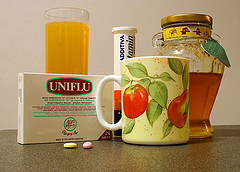Complimentary Medicine – Herbal Medicine

The use of complimentary medicine and natural foods to boost our bodies’ defenses and immune systems is increasing in popularity. People are now viewing these types of alternative health sources as not only a preventative measure against common ailments but also as a beneficial treatment when used alongside modern medicine to combat health problems and speed up the recovery process.
Although it is growing in popularity among users there is still much controversy and debate about the benefits of holistic health practices with many advocates of the use of modern medicine alone viewing these natural health sources with suspicion and doubt.
Complimentary medicine practices range from physical treatments such as massage and reflexology to spiritual treatments such as reiki, The practice of herbal medicine is one of the oldest forms of complimentary medicine and its uses range from the simplest practice of using herbs as a health food in home cooking, to ointments, herbal teas, creams, powders and pills.
Herbal Medicine is used to treat many common conditions such as, eczema, migraine, asthma, insomnia, digestive disorders, anxiety and mild depression.
Herbs that are frequently used include:
Peppermint – often used to help ease digestive discomforts such as indigestion and heartburn, a common ingredient in many over the counter remedies.
Garlic – Used to reduce flu-like symptoms and reduce cholesterol.
Ginger – Often used as an aid to reducing nausea and morning sickness.
St John’s Worth – Used as a natural anti-depressant, can be prescribed by doctors in some cases, (although the use of this herb is not permitted in all countries)
Although many are adopting herbal medicine practices, until studies have been carried out fully and these natural remedies have been proven effective they should not be used as a replacement to modern medicine practices and treatments. If you are considering using complimentary treatments it is advisable that you consult your doctor to find out your suitability for any course of treatment. In most cases natural therapy is beneficial and compliments a healthy lifestyle regime there are some instances where certain treatments should not be used.
There are many instances in both modern and complimentary medicine where certain elements or ingredients should be avoided, some of these include pregnancy and depression treatment. I have always taken an interest in holistic health and wherever possible choose a natural remedy, however I would not do this without being advised by my own doctor. As a mother I have found there are simple ways to increase my families intake of beneficial herbs as well as other natural foodstuffs by replacing processed sweeteners by a natural substitute, such as honey.
